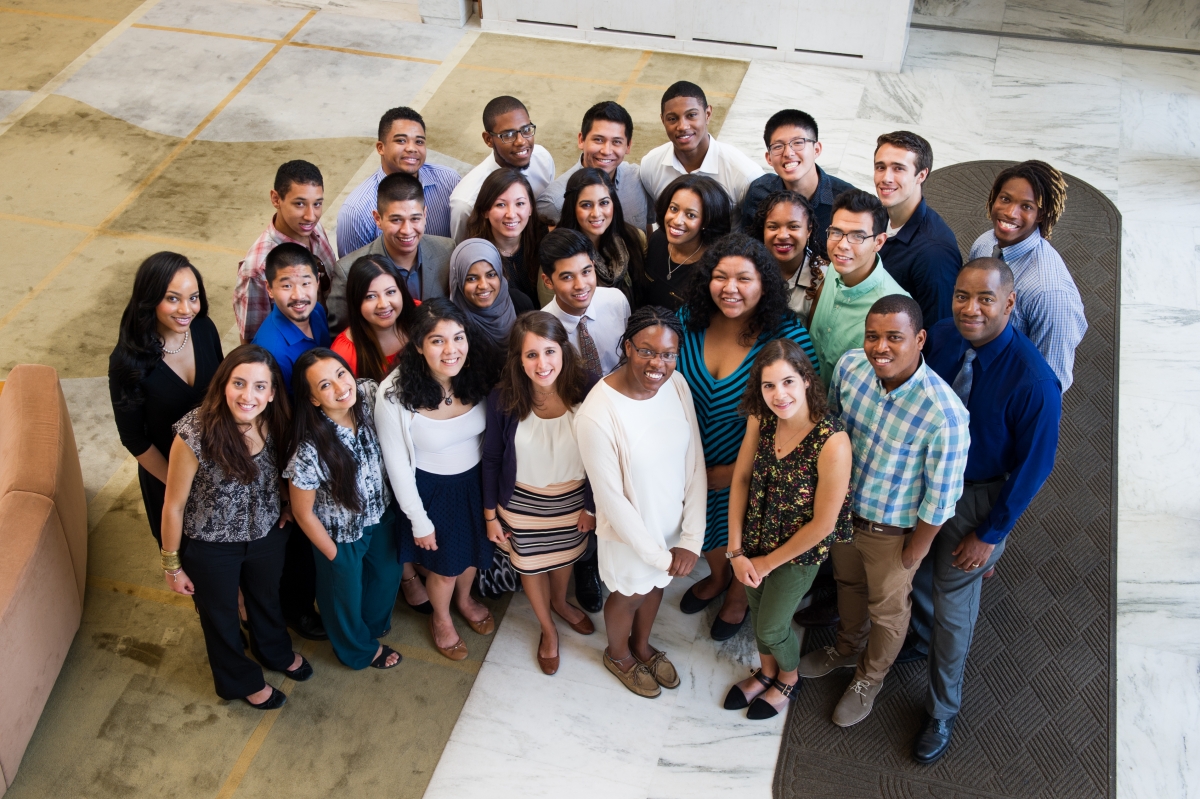Aug 05 2015
By
Kathryn Lopez
Source
Woodrow Wilson School
In mid-June, 29 rising college seniors cut their summer breaks short and set up shop at Princeton University’s Woodrow Wilson School of Public and International Affairs.
The undergraduates in this year’s Junior Summer Institute (JSI) class hailed from 24 U.S. colleges and universities, representing 16 states and 14 majors. The seven-week program prepares students for graduate study and careers in public policy and international affairs.
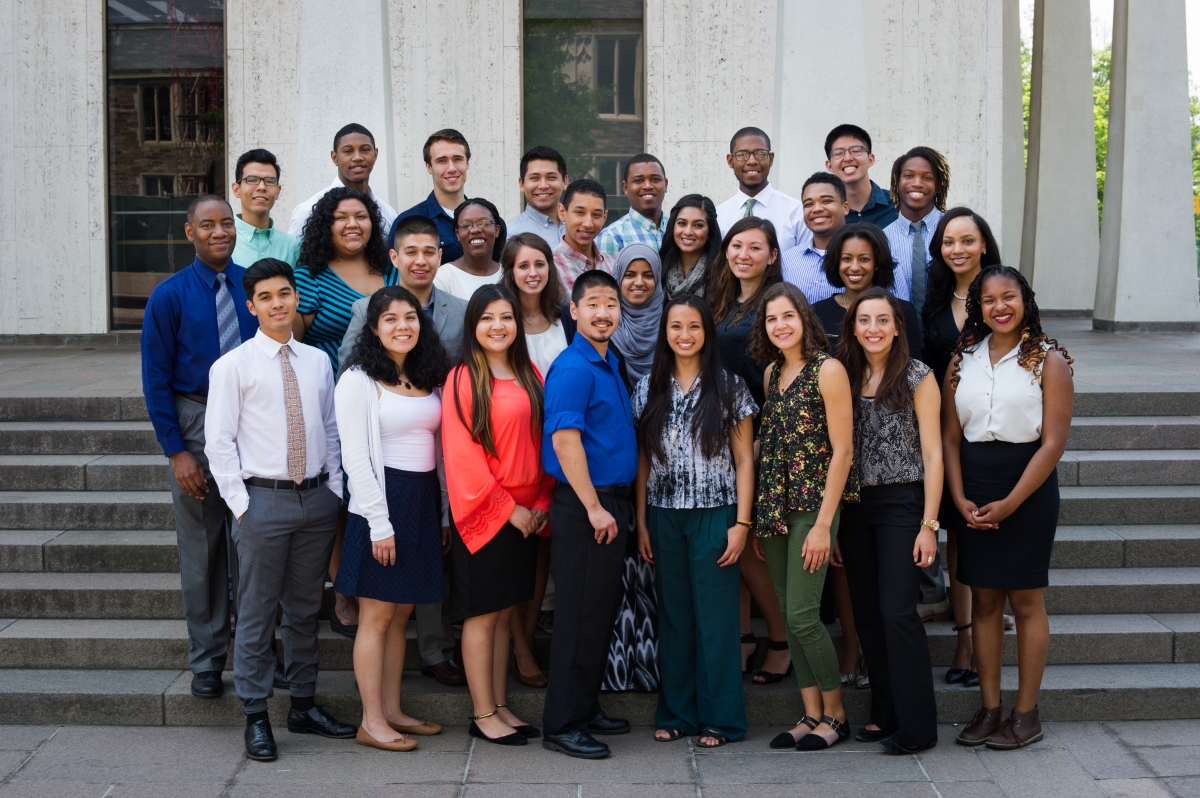 Students are admitted to JSI based on a demonstrated commitment to public service and multicultural social issues.
Students are admitted to JSI based on a demonstrated commitment to public service and multicultural social issues.“This year’s JSI students are exceptionally motivated to bring about change and serve others in the domestic and international arenas,” said Director of Graduate Student Life Gilbert Collins, MPA ’99. “In light of the challenges facing our country and our world, their contributions are needed now more than ever.”
In addition to his work for the Wilson School’s graduate program, Collins manages the School’s JSI program, which he participated in himself as an undergraduate at Harvard University.
The fully-funded program, sponsored by the Wilson School for nearly 30 years, is part of the Public Policy and International Affairs Fellowship Program. Summer sessions are also hosted at Carnegie Mellon University, the University of California-Berkeley and the University of Michigan.
The curriculum encompasses microeconomics, statistics, writing, public speaking, organization and time management – all necessary skills for a policymaker’s toolkit.
In addition, students participate in a policy workshop, a seminar in which a real world policy issue is dissected and analyzed. The final product is a group presentation to a mock panel made up of real life experts. Each year, two workshops are offered, one focusing on international policy and the other on domestic policy. This summer, the two workshops were “U.S.-EU Cooperation on Conflict Resolution” and “Health Care in Correctional Facilities: How Ethics and Finances Affect Policy Choices.”
International Policy
James Gadsden, MCF '85 and former U.S. ambassador to Iceland, led the “U.S.-EU Cooperation on Conflict Resolution” seminar. This workshop was geared toward examining challenging international relations issues in real time.
“The class gave students the experience of thinking critically and analytically about policy challenges we face and developing recommendations that are not only intellectually sound but designed for effective implementation,” Gadsden said.
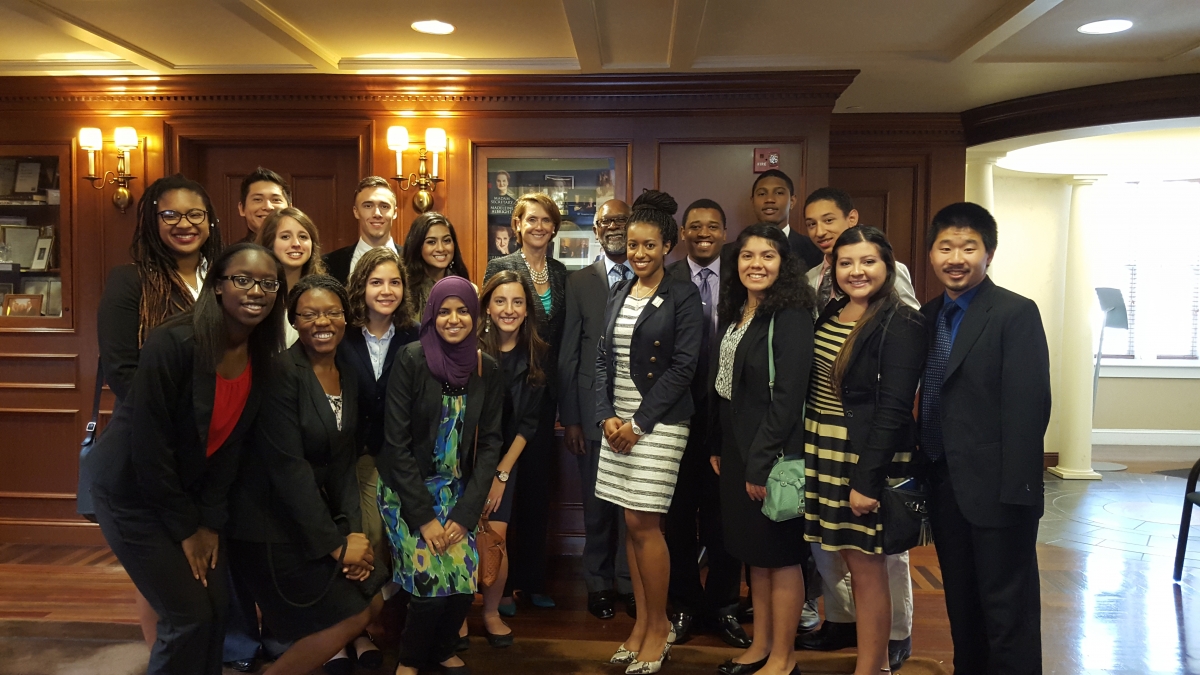 The students conducted research and wrote joint papers offering policy recommendations, which they presented in an oral briefing to a mock panel including George Bustin '70, senior counsel at the international law firm of Cleary Gottlieb Steen & Hamilton; Lino Guttierez, former U.S. ambassador to Argentina and Nicaragua; and Lisa Bucher, a political analyst in the Office of Analysis for Russia and Eurasia, Bureau of Intelligence and Research, in the U.S. Department of State.
The students conducted research and wrote joint papers offering policy recommendations, which they presented in an oral briefing to a mock panel including George Bustin '70, senior counsel at the international law firm of Cleary Gottlieb Steen & Hamilton; Lino Guttierez, former U.S. ambassador to Argentina and Nicaragua; and Lisa Bucher, a political analyst in the Office of Analysis for Russia and Eurasia, Bureau of Intelligence and Research, in the U.S. Department of State.Each group focused on U.S. national security and how the U.S. and European Union might cooperate to resolve one of these conflicts: narcotics trafficking out of Colombia, the Iran-Iraq-Islamic State complex, conflicts in Africa as they relate to terrorism and refugees, and the Ukraine-Russia-EU energy dynamic.
The mock panel critiqued the four presentations, while probing for further analysis, such as what can be done within Colombia’s borders to decrease drug crime, or how domestic politics in the Middle East might affect U.S. strategy in the region.
The class also met with experts at the U.S. Department of State on a trip to Washington, D.C., which included a career fair and visit with Ambassador (ret.) Barbara Bodine, director for the Institute for the Study of Diplomacy at Georgetown University and former lecturer and director of the Scholars in the Nation’s Service Initiative at the Wilson School. Her more than 30 years in the Foreign Service included serving as U.S. ambassador to Yemen during the United States Ship Cole bombing and deputy chief of mission in Kuwait amid the Iraqi occupation.
“The visit to Washington complemented the academic studies with views of senior practitioners and enriched the students’ understanding of the issues,” Gadsden said.
Domestic Policy
The domestic policy workshop offered a similar experience. The students studied the parallel forces of a rapidly rising prison population, the breakdown of mental health care institutionalization and the significant increase in health care costs. The shifts have left the criminal justice system responsible for many struggling with substance and behavioral health issues, leaving correctional facilities in crisis.
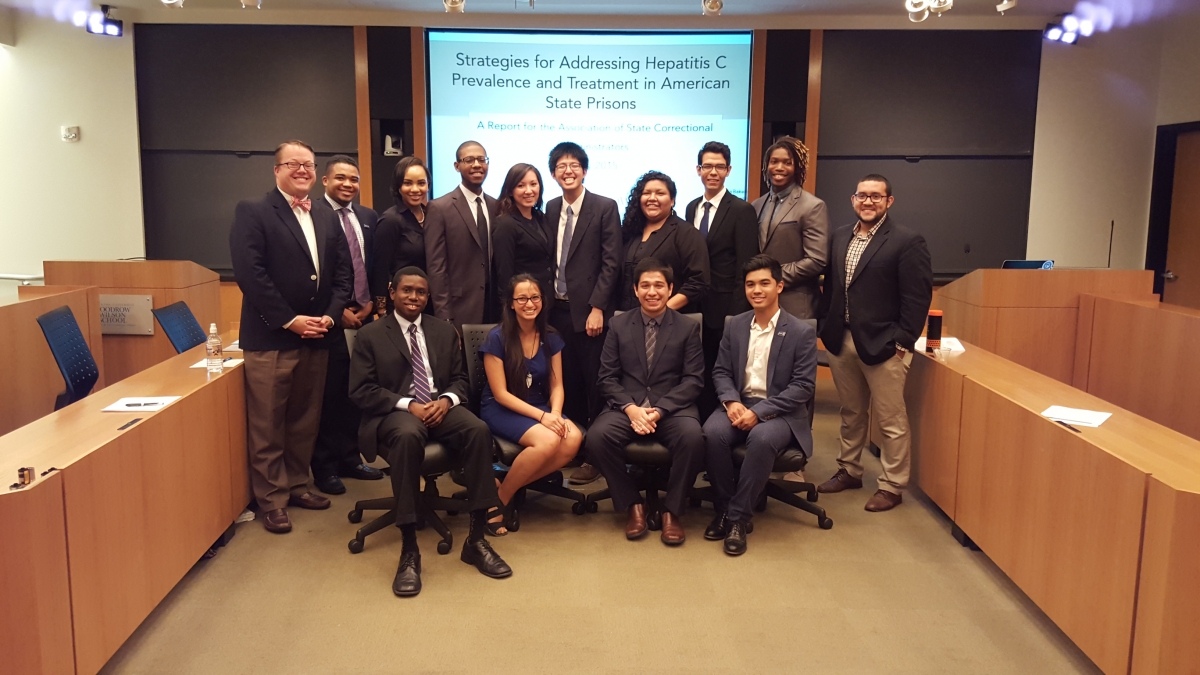 The students analyzed the legal, financial and ethical factors at play in policy surrounding the matter of providing healthcare to inmates. They came together in one final policy paper and presentation.
The students analyzed the legal, financial and ethical factors at play in policy surrounding the matter of providing healthcare to inmates. They came together in one final policy paper and presentation.“This year, the JSI domestic workshop students dug into a complex, multi-disciplinary policy problem: the dramatic rise in costs to treat Hepatitis C in prisons,” Daniel Meuse, the course instructor, said. “Thirty to 40 percent of U.S. prisoners are estimated to be infected with the chronic liver disease, most often contracted through IV drug use.”
The treatments released this year cure the disease, but cost up to $100,000 per person.
“For prisons, this treatment represents a true budget-buster,” Meuse said. “The students studied crime and prison policy, health care policy and the business of pharmaceuticals in the U.S. Informed by meetings with congressional staff in Washington, D.C., the students developed proposals balancing the ethics of providing or withholding treatments, constitutionally protected access to care and fiscal constraints.”
The students presented to Alecia J. McGregor, a postdoctoral research associate at the Center for Health and Wellbeing (CHW) at the Wilson School; Kimberly Bonner ’08, MPA ’12, a departmental guest at CHW and research associate with Médecins Sans Frontières; and Deborah H. Bae, senior program officer at the Robert Wood Johnson Foundation.
The final report offered a history of the criminal justice system, the science of Hepatitis C and recommendations of a comprehensive disease management and education program. It also proposed bulk-purchasing agreements that would allow a prison system to use its bargaining power to encourage pharmaceutical companies to lower the cost of treatment. The paper also cited new and emerging studies about prison populations and health care challenges.
Panel members asked the students about how to implement their recommendations; they also congratulated the students for becoming fluent in the state of correctional institutions while also learning the details of a complex disease, principles of public health and the ethics of treatment.
The Students
While the cohort grew and worked together over the course of the summer, the fabric of the program distinctly enhanced each student’s pursuits.
 Caylin Moore, an economics major and mathematics minor at Texas Christian University, said he saw JSI as an opportunity to gain the skills needed for policy analysis.
Caylin Moore, an economics major and mathematics minor at Texas Christian University, said he saw JSI as an opportunity to gain the skills needed for policy analysis. “I assumed that I would be able to grow in this program in my quantitative analysis skills and perspective on issues relevant to the world around me,” he said. “After the first rigorous week of advanced graduate level economics and statistics, I realized that I had assumed correctly.”
He also noted the diversity of issues and experiences brought forth by his classmates.
“I loved hearing Native American and gender issue narratives which I hadn’t ever been exposed to,” Moore said. “I now know that I have many more areas for growth and understanding if I want to make the impact on the world that I believe that I’m capable of.”
Nikiesha Hamilton, an international relations major concentrating in international institutions and foreign policy at American University, found the encouragement she received to be the most helpful.
“The professors, staff and students are beyond amazing, which allowed us to have a strong and caring learning community,” she said. “I woke up every day determined to improve on the skills that are necessary for me to be a catalyst for change because the JSI community provided the foundation and support that are needed.”
Sakari Ishetiar, an American University international relations major with a focus on Russia, agreed.
“Without a doubt the most interesting part was meeting my peers,” he said. “I’ve never been with a group that was this diverse but also so high-achieving. The other students created an atmosphere where I was positively pressured to succeed, while at the same time engaging in conversations about important social and political issues that other people are often afraid to discuss.”
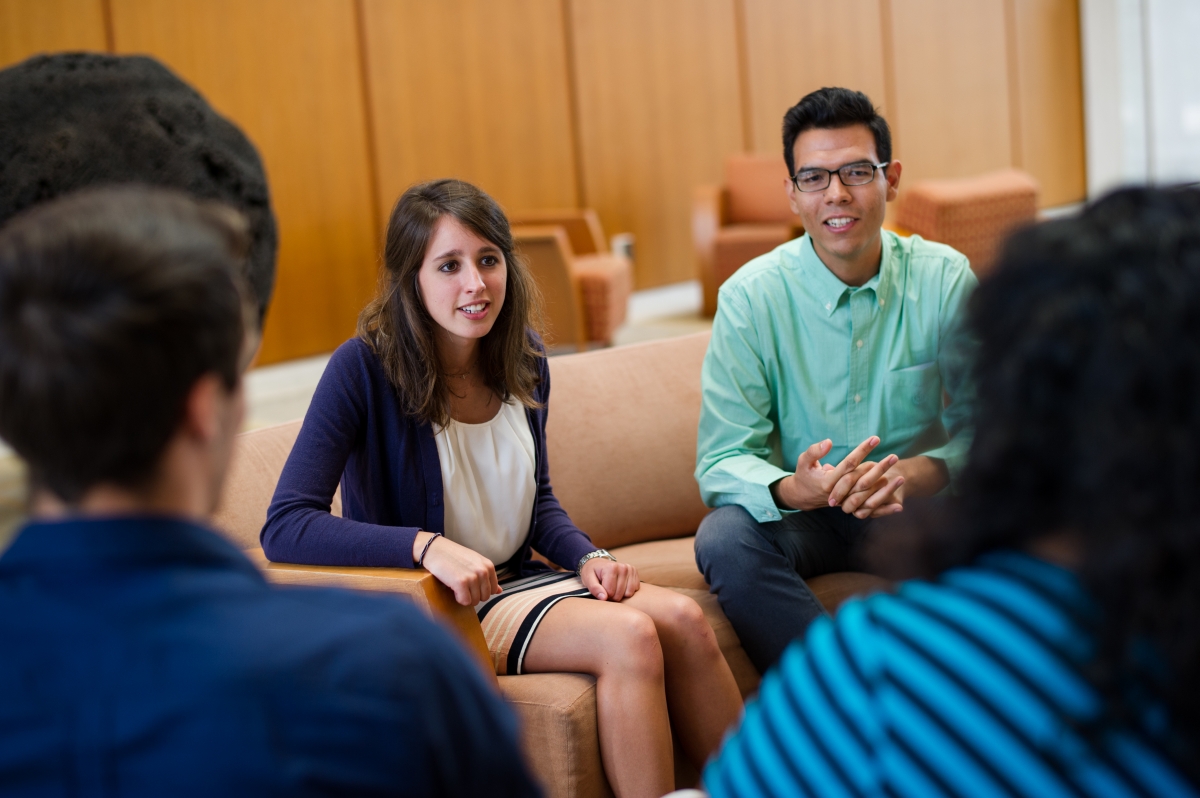 Floripa Olguin, a public policy major at Brown University, developed a renewed interest in statistics.
Floripa Olguin, a public policy major at Brown University, developed a renewed interest in statistics.“The program opened my eyes to the ways in which quantitative data can be used to drive policy, especially in connecting evidence between correlations to solve a problem,” she said.
Olguin grew up in a Pueblo community in New Mexico. After she graduates from Brown, she intends to return to her hometown and use her quantitative skills to increase access to education and address income inequality for Native Americans.
“Often times, Native populations aren’t included in a lot of important studies due to low population,” Olguin said. “This program gave me the tools to notice those disparities in representation on important policy issues and, even further, to be able to fill that gap to an extent.”
Ashby Jong Henningsen, a political science and global studies major with a minor in English at the University of Maryland, Baltimore County (UMBC), noted the opportunity to learn from policy professionals.
“I benefitted most from the opportunities to meet public affairs professionals in the public and non-profit sectors via policymaker lunches, as well as from the interaction with my JSI peers,” Henningsen said. “Learning about different individuals’ distinct experiences and focuses in public service broadened my awareness of the opportunities and challenges inherent in pursuing such a career, both domestically and abroad.”
Alice Muehlhof, instructor of “Intro/Intermediate Statistics” and research specialist at CHW, said that while each student she taught is on a unique path, they shared the common desire to make the world a better place.
“This class, in addition to having the lofty goal of improving things in the world, also took the time to look after each other,” Muehlhof said. “As a group, they were kind and thoughtful.”
Muehlhof, in her fourth year teaching in the program, said this is an extraordinary experience for her as well.
“There is no doubt in my mind that each year I learn more from them than they could learn from me,” she said. “They are very patient in explaining their thought processes. If they think I am looking at something incorrectly, they take the time to explain why. From these students, we learn how important daily dialogue is to solving the world’s problems.”
Ricardo Hurtado MPA '15, the domestic policy workshop teaching assistant, said JSI is the first program of its kind he’s seen that genuinely reflects diversity, equity and inclusion.
“In programs like JSI, you see just how valuable bringing together a diverse cohort from communities typically underrepresented can be,” he said. “These students are an asset not just to the program, but to the entire university. More importantly, I've been overwhelmingly impressed by the students’ levels of engagement. Their commitment to public service and never-ending curiosity leaves me no doubt that these are the next great leaders of our nation. The future is bright.”
